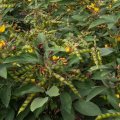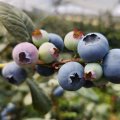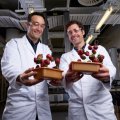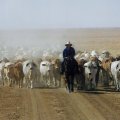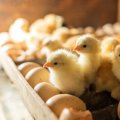With the world population predicted to hit 9 billion in 2050 and land and water resources in decline, the focus for World Food Day on Tuesday 16 October will be on how to do more with less.
The United Nations’ Food and Agriculture Organisation this week confirmed that 870 million people worldwide are hungry today – that is one in eight people who are currently not getting enough food.
The University of Queensland is working on solutions to reduce this number and feed a growing world population by designing sustainable agricultural and food systems for the future.
Head of UQ’s School of Agriculture and Food Sciences, Professor Neal Menzies, says the ‘New Agriculture’ that underpins this research strengthens sustainability and protects biodiversity, while improving productivity to meet this challenge.
“UQ researchers are using cutting-edge molecular and genetic approaches for the rapid generation of new crop varieties, boosting food nutrition and storage, improving land and crop management strategies and supporting communities around the world as they work to develop sustainable agricultural systems,” Professor Menzies said.
“We work with the Australian Centre for International Agricultural Research on projects in developing overseas countries and, for example, recently helped highland farmers in Papua New Guinea with the development of sustainable sweet potato cropping systems.”
UQ has more than 200 research scientists focused on creating a more sustainable Australia and contributing to global food security within the School of Agriculture and Food Sciences and the Queensland Alliance for Agriculture and Food Innovation. They collaborate on research with scientists across UQ’s other schools and institutes and with industry.
A selection of research being undertaken at UQ that is leading the world towards a better food security future includes:
Developing new high-yield and disease-resistant crops
• Boosting sorghum calories to minimise agricultural expansion: In large parts of Africa sorghum is a staple food crop and its vital role in food security will continue to expand because of its drought tolerance and ability to grow on marginal land. However, sorghum has low digestibility compared to other cereals. Two synergistic UQ projects are looking at how to increase the caloric value of sorghum using reverse genetics approaches to identify genes for grain quality and digestibility. Developing selection tools for producing enhanced next generation Sorghums is important for regions such as Africa where malnutrition is rife and will allow an increase in production without the expansion of agricultural land. Researchers: Dr Edward Gilding, e.gilding@uq.edu.au and Dr Bradley Campbell, b.campbell2@uq.edu.au (07)3365 3447 (School of Agriculture and Food Sciences)
• Nexgen plant innovation provides game shift in virus resistance (cotton, sugarcane, wheat, soybean, maize, rice, potato): Nexgen, a cutting edge anti-viral technology for plants developed at UQ, is on the path to commercialisation. The Nexgen technology includes transgenic and cisgenic breeding methods that confer virus resistance into existing commercial varieties of crops in less than 12 months. The resistance is expected to work for hybrid seed production linking in with current breeding programs. The research team has shown the feasibility of the approach for a range of high-value crops such as sugarcane, soybean, maize, rice, potato, wheat and cotton for resistance to Potyviruses, Tospoviruses, Cucumoviruses and Geminiviruses using the Nexgen technology. Researcher: Associate Professor Peer Schenk, (07) 3365 8817, p.schenk@uq.edu.au (School of Agriculture and Food Sciences)
• Improving rice grain quality and nutrition: Professor Melissa Fitzgerald pioneered research on characterising the genetic diversity and genetic controls of rice quality and nutrition traits, leading to the development of new methods and molecular markers for breeding programs. She also set new standards in high-quality, efficient grain quality services provided to breeding programs around the world and established of the International Network for Quality Rice which aims to bring new science to traits of quality, standardise the measurement of quality traits, and identify new traits of physical, sensory, and nutritional quality. Researcher: Professor Melissa Fitzgerald, (07) 3346 8893, m.fitzgerald2@uq.edu.au (School of Agriculture and Food Sciences)
• Australian wild rice characterisation: Professor Robert Henry’s speciality research area is the study of agricultural crops using molecular tools. He is particularly interested in Australian flora and plants of economic and social importance and has led the way in research into genome sequencing to capture novel genetic resources for the diversification of food crops to deliver improved food products. Researcher: Professor Robert Henry, (07) 3346 0552, robert.henry@uq.edu.au (Queensland Alliance for Agriculture and Food Innovation)
• Manipulating protein signalling to boost yields in rice and other crops: Professor Jimmy Botella’s research includes the study and characterisation of Heterotrimeric G-proteins in plants. This family of proteins is vital and extensively studied in animal systems, but their role in plant systems is still largely unknown. Professor Botella’s newly published data has revealed that G-proteins are important yield-enhancing factors in crops such as rice. Researcher: Professor Jimmy Botella, (07) 3365 1128, j.botella@uq.edu.au (School of Agriculture and Food Sciences)
Developing sustainable livestock production systems
• Improving reproductive performance of cattle in Indonesia and Australia: Indonesian demand for beef is rising by 4 per cent each year. The trend to increasing beef consumption is driven by the westernisation of diets, coupled with more Indonesians living in urban centres and having more disposable income. Indonesia's Government has placed a high priority on achieving self-sufficiency in beef cattle production. Increasing production depends on smallholder enterprises, located in densely populated rural areas, boosting reproductive rates of cows and improving management techniques to accelerate the fattening of animals so they can be sold at market sooner. To achieve these objectives, changes are required to the traditional feeds of rice straw combined with small amounts of crop residues and supplements. Using a systems approach combining on-station and on-farm trials, mixes of high quality feeds to fatten animals and traditional feeds to maintain weight gain and body condition will be trialled to develop a new feed system. This is expected to increase calf output to close to one calf per year, rather than calving every 18-24 months. Project leader: Professor Dennis Poppi, d.poppi@uq.edu.au, (School of Agriculture and Food Sciences)
• Enhancing smallholder cattle production in East Timor: As East Timor's economy grows, the demand for livestock products also is expected to grow. Now is an ideal time to support development of the smallholder cattle sector, thereby increasing beef production for human consumption, farmers' incomes from domestic cattle sales and, in the longer-term, financial returns from live cattle export sales to Indonesia. But the majority of farmers and support agency staff are under-skilled, thus limiting identification and adoption of better cattle management practices. This project aims to use a whole-of-chain approach to initiate a shift in East Timor smallholder beef farming practices. The intention is to assist farmers to move from being mostly livestock keepers to becoming producers with better market access. It is the first stage of a 10-year program. Project Leader: Dr Geoffry Fordyce, (07) 4761 5173, g.fordyce@uq.edu.au, (Queensland Alliance for Agriculture and Food Production)
• Improving goat production in South Sulawesi: In Indonesia the local and export demand for goats is high. They are often integrated with vegetable and estate crops through three operation systems; scavenging; daytime foraging with evening cut and carry; and intensive cut and carry of feeds. However, in South Sulawesi a number of constraints limit industry development and market improvements. Developing a more integrated supply chain, with improved production, management, markets and access to markets, could help both the local and export market. This project has shown that iodine, in the Povidon form, when applied to the skin of goats overcomes goitre problems quickly. The project has also developed a practical, cheap and accurate method and tool for estimating the live weight of goats for specific populations of goats and gained a better understanding of the consumer constraints in Makassar and the supply chain of goats in Sulawesi and its interconnection with other islands in Indonesia. Farmers involved with project (and those from neighbouring villages) have increased knowledge and skills of: solution to goitre problem, improved feeding other than gliracidia, and capacity to better manage and market their goats. Project Leader: Dr Peter Murray, (07) 5460 1256, peter.murray@uq.edu.au, (School of Agriculture and Food Sciences)
Overcoming soil nutritional constraints to crop productivity
• Improving the nutrition of poor soils in Australia and developing countries: Professor Neal Menzies is involved in agricultural production systems research primarily directed at overcoming nutritional constraints to productivity both in Australia and in the developing world. He is involved in Australian Centre for International Agricultural Research (ACIAR) funded research projects in India, Vietnam, the Philippines and Indonesia. Projects have included nutritional studies on nitrogen, phosphorus, potassium, calcium, magnesium, sulfur, and copper. Researcher: Professor Neal Menzies (07) 5460 1047 or (07) 3365 1175, n.menzies@uq.edu.au (School of Agriculture and Food Sciences)
• Making acid soils fertile: Dr Peter Kopittke is hoping to solve a mystery that affects 50 per cent of Australia’s agricultural land (40 per cent of land worldwide) and costs $1.5 billion per year in foregone production. He received a $702,829 fellowship this year to investigate why Aluminium and other trace metals are toxic to plants growing in acidic soils. Identification of the mechanisms of Aluminium toxicity will provide the necessary ‘building-blocks’ required to begin developing Aluminium-tolerant cultivars and will provide the key to improving crop yields in degraded soils. Researcher: Dr Peter Kopittke, (07) 3346 9149, 0421 018 311, p.kopittke@uq.edu.au (School of Agriculture and Food Sciences)
World Food Day is organised by the United Nations’ Food and Agriculture Organisation and is celebrated by more than 150 countries.
Media enquiries: Kathy Grube, UQ School of Agriculture and Food Sciences, 0418 524 297, k.grube@uq.edu.au
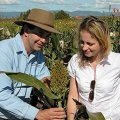

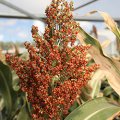
.jpg)

